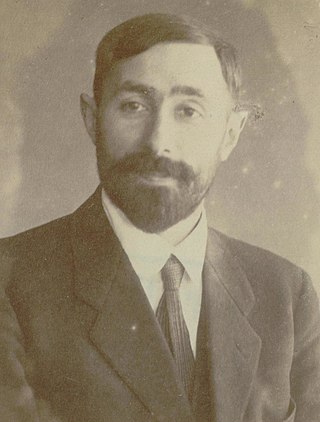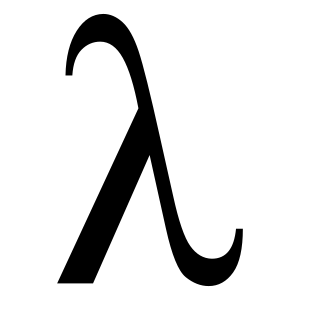Related Research Articles
In mathematics and computer science, currying is the technique of translating the evaluation of a function that takes multiple arguments into evaluating a sequence of functions, each with a single argument. For example, currying a function that takes three arguments creates a nested unary function , so that the code
In computer science, functional programming is a programming paradigm where programs are constructed by applying and composing functions. It is a declarative programming paradigm in which function definitions are trees of expressions that map values to other values, rather than a sequence of imperative statements which update the running state of the program.
Lambda calculus is a formal system in mathematical logic for expressing computation based on function abstraction and application using variable binding and substitution. It is a universal model of computation that can be used to simulate any Turing machine. It was introduced by the mathematician Alonzo Church in the 1930s as part of his research into the foundations of mathematics.

In theoretical computer science and mathematics, the theory of computation is the branch that deals with what problems can be solved on a model of computation, using an algorithm, how efficiently they can be solved or to what degree. The field is divided into three major branches: automata theory and formal languages, computability theory, and computational complexity theory, which are linked by the question: "What are the fundamental capabilities and limitations of computers?".
In mathematics, logic, and computer science, a type theory is the formal presentation of a specific type system, and in general type theory is the academic study of type systems. Some type theories serve as alternatives to set theory as a foundation of mathematics. Two influential type theories that were proposed as foundations are Alonzo Church's typed λ-calculus and Per Martin-Löf's intuitionistic type theory. Most computerized proof-writing systems use a type theory for their foundation. A common one is Thierry Coquand's Calculus of Inductive Constructions.
Unlambda is a minimal, "nearly pure" functional programming language invented by David Madore. It is based on combinatory logic, an expression system without the lambda operator or free variables. It relies mainly on two built-in functions and an apply operator. These alone make it Turing-complete, but there are also some input/output (I/O) functions to enable interacting with the user, some shortcut functions, and a lazy evaluation function. Variables are unsupported.
Combinatory logic is a notation to eliminate the need for quantified variables in mathematical logic. It was introduced by Moses Schönfinkel and Haskell Curry, and has more recently been used in computer science as a theoretical model of computation and also as a basis for the design of functional programming languages. It is based on combinators, which were introduced by Schönfinkel in 1920 with the idea of providing an analogous way to build up functions—and to remove any mention of variables—particularly in predicate logic. A combinator is a higher-order function that uses only function application and earlier defined combinators to define a result from its arguments.
In mathematics and computer science in general, a fixed point of a function is a value that is mapped to itself by the function.
Curry's paradox is a paradox in which an arbitrary claim F is proved from the mere existence of a sentence C that says of itself "If C, then F", requiring only a few apparently innocuous logical deduction rules. Since F is arbitrary, any logic having these rules allows one to prove everything. The paradox may be expressed in natural language and in various logics, including certain forms of set theory, lambda calculus, and combinatory logic.
In programming language theory and proof theory, the Curry–Howard correspondence is the direct relationship between computer programs and mathematical proofs.
A typed lambda calculus is a typed formalism that uses the lambda-symbol to denote anonymous function abstraction. In this context, types are usually objects of a syntactic nature that are assigned to lambda terms; the exact nature of a type depends on the calculus considered. From a certain point of view, typed lambda calculi can be seen as refinements of the untyped lambda calculus, but from another point of view, they can also be considered the more fundamental theory and untyped lambda calculus a special case with only one type.

Moses Ilyich Schönfinkel was a logician and mathematician, known for the invention of combinatory logic.
In the Scheme computer programming language, the procedure call-with-current-continuation, abbreviated call/cc, is used as a control flow operator. It has been adopted by several other programming languages.
The SKI combinator calculus is a combinatory logic system and a computational system. It can be thought of as a computer programming language, though it is not convenient for writing software. Instead, it is important in the mathematical theory of algorithms because it is an extremely simple Turing complete language. It can be likened to a reduced version of the untyped lambda calculus. It was introduced by Moses Schönfinkel and Haskell Curry.
In computer science and logic, a dependent type is a type whose definition depends on a value. It is an overlapping feature of type theory and type systems. In intuitionistic type theory, dependent types are used to encode logic's quantifiers like "for all" and "there exists". In functional programming languages like Agda, ATS, Coq, F*, Epigram, and Idris, dependent types help reduce bugs by enabling the programmer to assign types that further restrain the set of possible implementations.
The simply typed lambda calculus, a form of type theory, is a typed interpretation of the lambda calculus with only one type constructor that builds function types. It is the canonical and simplest example of a typed lambda calculus. The simply typed lambda calculus was originally introduced by Alonzo Church in 1940 as an attempt to avoid paradoxical use of the untyped lambda calculus.

Programming language theory (PLT) is a branch of computer science that deals with the design, implementation, analysis, characterization, and classification of formal languages known as programming languages. Programming language theory is closely related to other fields including mathematics, software engineering, and linguistics. There are a number of academic conferences and journals in the area.
In mathematics and computer science, apply is a function that applies a function to arguments. It is central to programming languages derived from lambda calculus, such as LISP and Scheme, and also in functional languages. It has a role in the study of the denotational semantics of computer programs, because it is a continuous function on complete partial orders. Apply is also a continuous function in homotopy theory, and, indeed underpins the entire theory: it allows a homotopy deformation to be viewed as a continuous path in the space of functions. Likewise, valid mutations (refactorings) of computer programs can be seen as those that are "continuous" in the Scott topology.
In computer science, lambda calculi are said to have explicit substitutions if they pay special attention to the formalization of the process of substitution. This is in contrast to the standard lambda calculus where substitutions are performed by beta reductions in an implicit manner which is not expressed within the calculus; the "freshness" conditions in such implicit calculi are a notorious source of errors. The concept has appeared in a large number of published papers in quite different fields, such as in abstract machines, predicate logic, and symbolic computation.
The categorical abstract machine (CAM) is a model of computation for programs that preserves the abilities of applicative, functional, or compositional style. It is based on the techniques of applicative computing.
References
- ↑ Wolfengagen V.E. Methods and means for computations with objects. Applicative Computational Systems. — M.: JurInfoR Ltd., «Center JurInfoR», 2004. — xvi+789 pp. ISBN 5-89158-100-0.
- ↑ Backus, J. (1978). "1977 Turing Award Lecture: Can Programming Be Liberated from the von Neumann Style? A Functional Style and Its Algebra of Programs". Comm. Of the ACM. 2 (8): 613–641. doi: 10.1145/359576.359579 . S2CID 16367522.